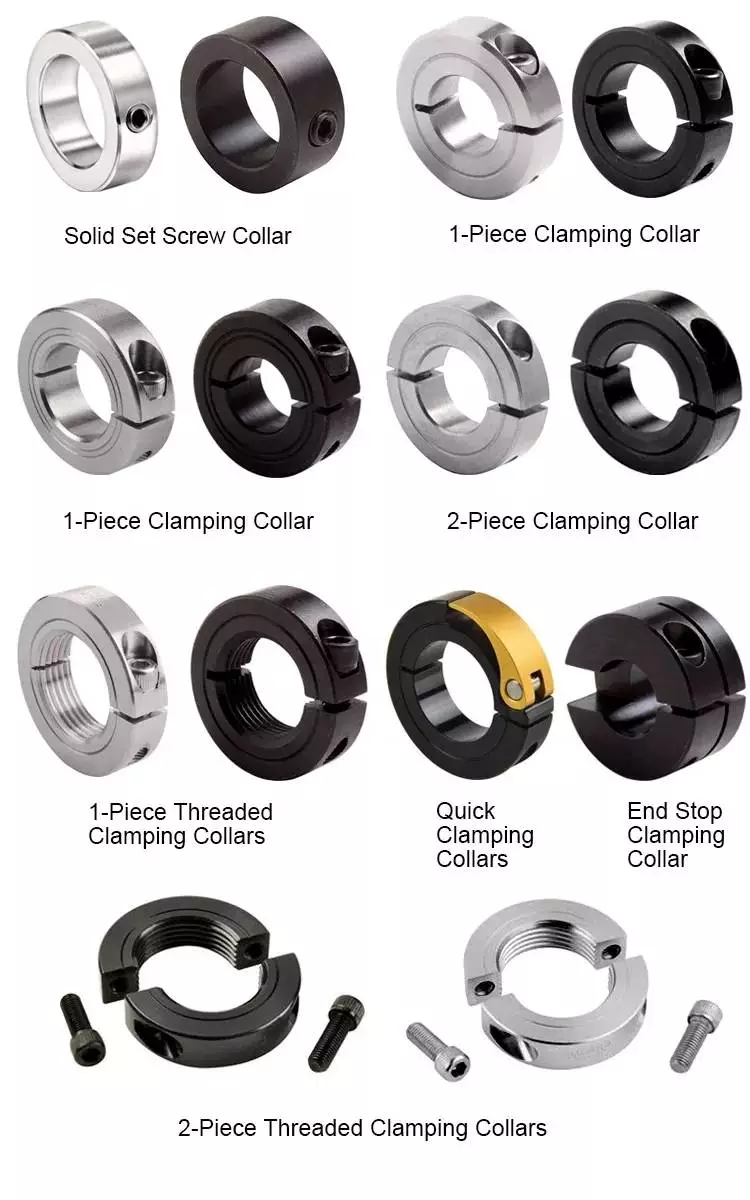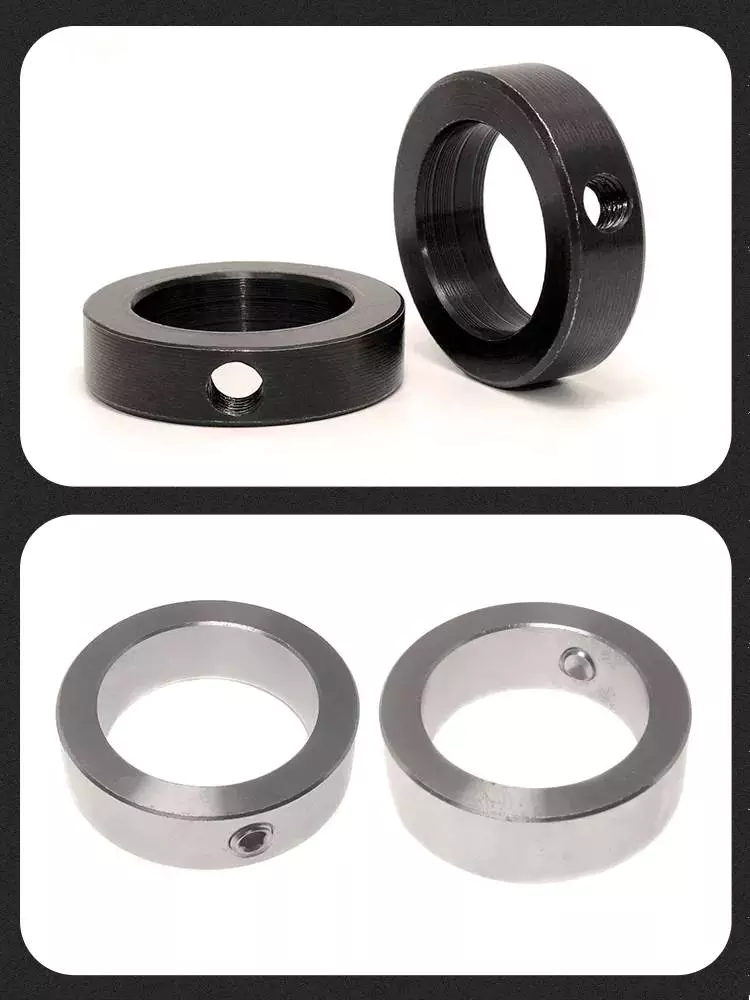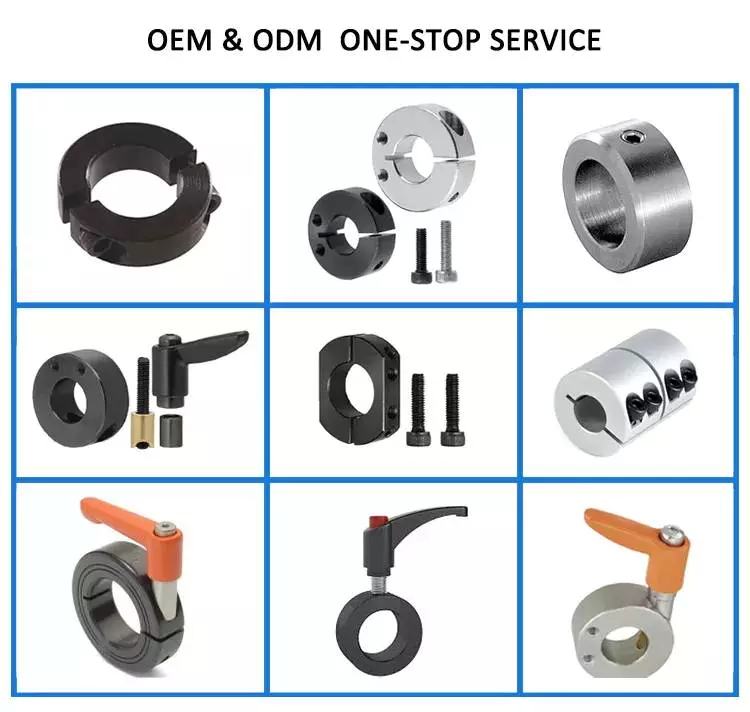
Can I purchase shaft collars with specific certifications for certain industries?
Yes, it is possible to purchase shaft collars with specific certifications for certain industries. Certifications ensure that the shaft collars meet specific standards, requirements, or regulations established for particular industries or applications. Here are some important points to consider when purchasing shaft collars with specific certifications:
- Industry-Specific Certifications: Different industries may have specific certifications or standards that shaft collars need to meet to ensure compliance with safety, performance, or regulatory requirements. For example, industries such as automotive, aerospace, food processing, medical, or oil and gas may require shaft collars that meet certifications such as ISO 9001 (quality management system), ISO 14001 (environmental management system), AS9100 (aerospace quality management system), or FDA (Food and Drug Administration) compliance. Identify the specific certifications relevant to your industry and application.
- Manufacturer Certifications: Some manufacturers specialize in producing shaft collars that are certified for specific industries or applications. They may have their own certifications or comply with industry-specific standards. When purchasing shaft collars, look for manufacturers who have the necessary certifications and a track record of producing compliant products. Their certifications should be prominently displayed on their website, product documentation, or available upon request.
- Product Documentation and Specifications: Shaft collar manufacturers often provide product documentation, specifications, or datasheets that outline the certifications and standards their products comply with. These documents may include information about industry-specific certifications, material certifications (such as RoHS compliance for restricted substances), or performance ratings. Review the product documentation carefully to ensure the shaft collars meet the necessary certifications for your industry or application.
- Supplier Verification: If you are purchasing shaft collars from a supplier or distributor, verify that they source their products from reputable manufacturers who adhere to industry-specific certifications. Request documentation or certifications from the supplier to confirm compliance. It is essential to ensure that the entire supply chain, from the manufacturer to the supplier, maintains the necessary certifications required for your industry.
- Consultation with Industry Experts: If you have specific certification requirements for your industry or application and are unsure about the available options, it is advisable to consult with industry experts or engineers specializing in that field. They can provide guidance on the certifications needed and recommend suitable shaft collar manufacturers or suppliers who can meet those requirements.
When purchasing shaft collars with specific certifications, it is important to verify the authenticity and validity of the certifications. Look for reputable manufacturers, suppliers, or distributors who have a proven track record of delivering certified products and maintaining compliance with industry standards. The certifications provide assurance that the shaft collars meet the necessary quality and safety standards for your industry or application.

What are the advantages of using two-piece vs. one-piece shaft collars?
When considering shaft collars, you may come across two main types: two-piece and one-piece shaft collars. Each type has its advantages depending on the specific application and requirements. Here are the advantages of using two-piece and one-piece shaft collars:
Advantages of Two-Piece Shaft Collars:
- Easy Installation and Removal: Two-piece shaft collars are designed to be split into two halves, allowing for easy installation or removal on a shaft without the need to disassemble other components or move the shaft. This can save time and effort during installation or maintenance procedures.
- Positioning Flexibility: Two-piece collars often have a clamping mechanism that allows for fine adjustment and precise positioning along the shaft. This can be advantageous when precise placement is required, such as aligning components or achieving specific clearance or spacing.
- Accessibility for Retrofitting: In situations where it may be difficult or impractical to slide a collar onto the end of a shaft, two-piece collars provide a convenient retrofitting solution. They can be installed around the shaft by opening the collar and clamping it in place, making them suitable for retrofitting on existing shafts or equipment without requiring shaft disassembly.
- Shaft Protection: Two-piece collars typically have a split design with smooth, rounded edges, which helps prevent damage to the shaft during installation or removal. The collar halves can distribute clamping forces evenly, reducing the risk of shaft deformation or scoring.
- Collar Customization: Two-piece collars often offer more customization options, such as the ability to replace or interchange collar components, add features like mounting holes or attachment points, or modify the collar to accommodate specific shaft sizes or configurations.
Advantages of One-Piece Shaft Collars:
- Simplicity and Compactness: One-piece shaft collars have a simple, solid construction without any moving parts or additional components. This makes them compact and easy to handle, and they require less space along the shaft compared to two-piece collars.
- Cost-Effectiveness: One-piece collars are often more cost-effective than two-piece collars due to their simpler design and manufacturing process. They can be a budget-friendly option for applications where precise positioning or frequent adjustments are not required.
- High Clamping Force: One-piece collars can provide high clamping force due to their solid construction and uniform distribution of pressure. This makes them suitable for applications where a secure and rigid connection between the collar and the shaft is crucial.
- Low Maintenance: Since one-piece collars do not have moving or adjustable parts, they typically require less maintenance. Once installed, they provide a reliable and stable connection without the need for periodic adjustments or repositioning.
- Compatibility with High-Speed Applications: One-piece collars are generally well-suited for high-speed applications due to their solid construction and balanced design, which can minimize the risk of imbalance or vibration at high rotational speeds.
Ultimately, the choice between two-piece and one-piece shaft collars depends on factors such as the specific application requirements, ease of installation or retrofitting, customization needs, cost considerations, and desired level of adjustability or precision. It is important to evaluate these factors and select the type of shaft collar that best suits your needs for optimal performance and functionality.

What are the different types of shaft collars available in the market?
In the market, there are various types of shaft collars available, each designed to meet specific application requirements. Here are some commonly used types of shaft collars:
- Set Screw Shaft Collars: Set screw shaft collars are the most common type and feature one or more set screws that tighten against the shaft to secure the collar in place. These collars have a simple design and are available in various materials such as steel, stainless steel, or aluminum. Set screw collars are easy to install and provide a reliable grip on the shaft.
- Clamping Shaft Collars: Clamping shaft collars use a clamping mechanism, such as a split design with two halves and bolts, to tighten around the shaft. They provide a strong and secure grip and are often used in applications where frequent adjustments or repositioning of the collar is required. Clamping collars are available in different materials and can provide excellent holding power.
- One-Piece Solid Shaft Collars: One-piece solid shaft collars are made from a single piece of material, typically metal, and have no moving parts. They are simple in design and provide a lightweight and compact solution for applications where space is limited. These collars are often used in light-duty applications or as a stop or spacer on a shaft.
- Two-Piece Split Shaft Collars: Two-piece split shaft collars consist of two halves that can be assembled and tightened around the shaft using screws or bolts. This design allows for easy installation and removal without the need to slide the collar along the shaft. Two-piece split collars are commonly used in applications where the shaft cannot be easily disassembled or where frequent adjustments are required.
- Threaded Shaft Collars: Threaded shaft collars have internal threads that allow them to be screwed onto a shaft. They provide a secure and adjustable grip when tightened against the shaft. Threaded collars are often used in applications where precise positioning or fine adjustment is needed.
- Hinged Shaft Collars: Hinged shaft collars feature a hinge mechanism that allows for easy installation and removal without completely disassembling the collar. They are often used in applications where frequent access to the shaft is required or when the collar needs to be quickly repositioned or replaced.
- Flanged Shaft Collars: Flanged shaft collars have an extended flange on one side, which provides additional support and acts as a stopping point for other components. The flange helps prevent axial movement of the collar and provides a reference surface for locating or positioning other elements, such as bearings, gears, or pulleys.
- Specialty Shaft Collars: In addition to the standard types mentioned above, there are specialized shaft collars designed for specific applications. These include torque-limiting collars, indexing collars, quick-release collars, and shaft collars with integrated components such as gears or pulleys. These specialty collars cater to specific needs and offer unique features to enhance functionality or simplify assembly.
The choice of shaft collar type depends on factors such as the application requirements, shaft size, load capacity, ease of installation, and adjustability. It's important to select the appropriate type of shaft collar that best suits your specific application to ensure proper functionality and secure shaft positioning within the mechanical system.


editor by CX 2023-11-27